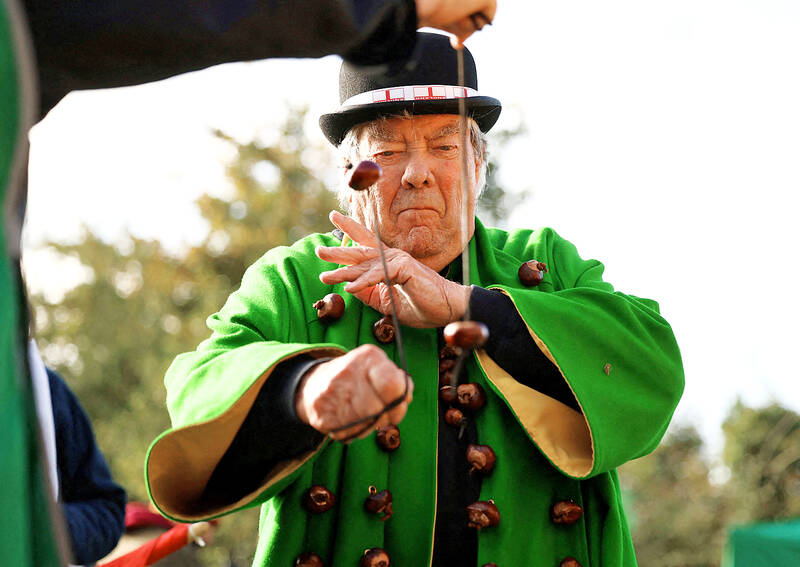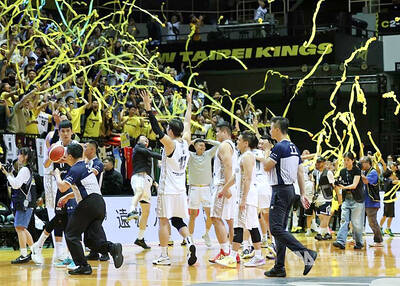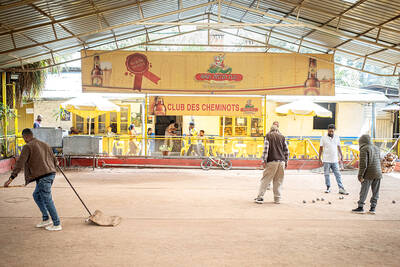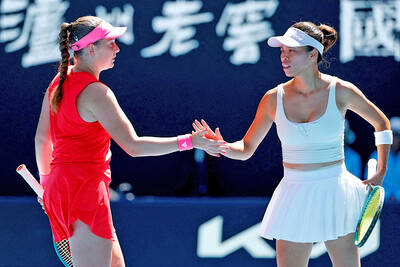A British chestnut-whacking champion was on Monday cleared of cheating after an investigation into alleged malfeasance at the World Conker Championships.
Organizers of the nutty annual event said that Dave Jakins, a veteran competitor nicknamed “King Conker,” did not use a steel chestnut to conquer his rival.
The traditional game, played by generations of British schoolchildren, involves players using conkers — the glossy brown seeds of the horse chestnut tree — threaded onto a string to try and smash their opponent’s chestnut.

Photo: Reuters
More than 200 conkers enthusiasts entered the annual competition in the village of Southwick in central England on Oct. 13.
Jakins, 82, won the men’s tournament, but organizers launched an investigation after claims that he might have used a steel chestnut that was in his pocket.
Investigators said they studied film and photographic evidence and took testimony from judges and umpires, and concluded that “it would be near impossible for Mr Jakins to have swapped the conkers unnoticed.”
“The conclusion of the investigation is that the World Championship Men’s title was won fairly, and that the steel conker was not used in play,” they said in a statement on Monday.
Organizers said they accepted Jakins’ claim “that he had had the [steel] conker to amuse people and as part of his role as ‘King Conker,’” and had used a real chestnut in the contest.
They also said the losing finalist, Alastair Johnson-Ferguson, had “accepted defeat with good grace and sportsmanship,” after media reports that he had made the cheating allegation.
The overall title of World Conker Champion was won by Kelci Banschbach, originally from Indianapolis. The 34-year-old was crowned “queen conker” after beating Jakins in the final. She was the first American to win the title since the World Conker Championships began in 1965.
Additional reporting by Reuters

The New Taipei Kings claimed the inaugural Taiwan Professional Basketball League (TPBL) championship on Sunday, defeating the Kaohsiung FamilyMart Aquas 108-89 in the final. Playing at home, the Kings pulled ahead with Jeremy Lin’s (林書豪) clutch three-pointers, securing their victory over the Aquas in the TPBL final. The Kings came out strong in the first quarter, dominating to build a 35-18 lead. By halftime, they had stretched their advantage to 61-38. In the third quarter, the Aquas narrowed the deficit to 12 points, but Lin stepped up, sinking several tough three- pointers to extend the lead. In the final quarter, the Kings pushed the

In an unlikely Ethiopian outpost of one the most French of pastimes, four men are leaning over their petanque balls, arguing over who is winning. Petanque, the bowling game also known as boules, is more readily associated with French village squares where locals launch metal balls at a jack while enjoying an afternoon drink, but for decades, it has also been a beloved pastime for members of a club near the iconic Meskel Square in the Ethiopian capital, Addis Ababa. It was founded in the early 20th century to cater to French railway workers, who built a line connecting Addis Ababa

Taiwanese women’s doubles star Hsieh Su-wei and Australian teenager Maya Joint on Tuesday eased into the Eastbourne Open quarter-finals in England as Hsieh prepares for the Wimbledon Championships next week. Four-time Wimbledon women’s doubles champion Hsieh and 19-year-old Joint fired two aces and converted five of eight break points to defeat Japan’s Shuko Aoyama and Poland’s Katarzyna Piter 6-3, 6-3 in 58 minutes on the grass court. Hsieh and Joint are today to face fourth seeds Barbora Krejcikova of the Czech Republic and Latvia’s Jelena Ostapenko, who advanced on Monday with a 6-4, 6-3 victory over Quinn Gleason of the US and

BEAT THE HEAT: A brutal heat wave in the US has made cooling breaks standard. Dortmund’s coach said the weather could shape the destiny of the tournament Chelsea on Tuesday beat Esperance of Tunisia 3-0 to set up a FIFA Club World Cup last-16 tie against SL Benfica, who earlier defeated Bayern Munich 1-0, as furnace-link heat and the threat of thunder and lightning wreak havoc at the tournament. Elsewhere, minnows Auckland City claimed a memorable draw against Boca Juniors, while Los Angeles bowed out of the tournament with a stalemate against Flamengo. In Charlotte, Andreas Schjelderup scored the only goal for Benfica in their Group C clash with Bayern in front of 33,287 fans, finishing first-time from a cutback by his fellow Norwegian Fredrik Aursnes in the 13th